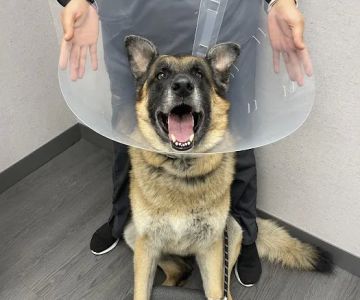- 1. Introduction: Understanding Liver Disease in Pets
- 2. Signs of Liver Disease in Pets
- 3. Treatment Options for Pets with Liver Disease
- 4. Nutritional Care for Pets with Liver Disease
- 5. Managing Pets with Liver Disease at Home
- 6. Real-Life Stories of Pets with Liver Disease
- 7. Where to Find Support for Pets with Liver Disease
1. Introduction: Understanding Liver Disease in Pets
Liver disease in pets, particularly in cats and dogs, is a condition that can significantly affect their health and quality of life. The liver plays a vital role in filtering toxins, processing nutrients, and supporting digestion, so when it's not functioning properly, your pet’s health can deteriorate quickly. Pet owners may not always recognize the early signs of liver disease, but understanding the condition and how to manage it is essential for ensuring your pet’s well-being.
This article will guide you through the signs, treatment options, and best care practices for pets diagnosed with liver disease. Whether your pet is undergoing treatment or you're simply looking to learn more, the insights provided here will help you better care for your beloved companion. We will also include advice on managing their nutritional needs and home care tips to make this challenging time easier for both you and your pet.
2. Signs of Liver Disease in Pets
Recognizing liver disease in pets early on can make a significant difference in their prognosis and overall health. Symptoms of liver disease can range from subtle changes to more noticeable physical signs. Here are some of the most common signs that your pet may have liver disease:
- Loss of Appetite – One of the earliest signs of liver problems is a decrease in appetite. If your pet is not eating or is eating significantly less, it may be an indication of liver distress.
- Weight Loss – As a result of reduced food intake, weight loss is common in pets with liver disease. This can also be compounded by the liver’s inability to properly metabolize nutrients.
- Jaundice (Yellowing of the Eyes or Gums) – Jaundice is a hallmark sign of liver dysfunction. It occurs when the liver is unable to filter bilirubin, which can build up in the bloodstream, causing a yellowish tint to your pet’s eyes, gums, or skin.
- Increased Thirst or Urination – Liver disease can affect kidney function, leading to increased thirst and frequent urination. This is an important sign to monitor, especially if it seems out of character for your pet.
- Vomiting and Diarrhea – Chronic vomiting or diarrhea can occur in pets with liver disease, as the body struggles to process food and eliminate toxins.
- Behavioral Changes – Pets may become lethargic, depressed, or irritable. Some pets may even experience confusion or difficulty walking, which can be related to liver encephalopathy, a complication of liver disease that affects brain function.
If you notice any of these symptoms, it's important to consult a veterinarian as soon as possible. Early detection and treatment can significantly improve your pet's chances of recovery and quality of life.
3. Treatment Options for Pets with Liver Disease
When your pet is diagnosed with liver disease, your veterinarian will work with you to create a treatment plan tailored to their specific needs. Treatment can vary depending on the severity and underlying cause of the liver disease. Here are some common treatment options:
- Medication – Depending on the cause of the liver disease, your pet may be prescribed medications to reduce inflammation, support liver function, or treat any infections. Medications such as antibiotics or corticosteroids may be used to address specific issues like bacterial infections or autoimmune diseases.
- Dietary Management – A specialized diet designed to support liver function is crucial for pets with liver disease. Your veterinarian may recommend prescription diets that are low in copper, easy to digest, and contain high-quality proteins. Supplements like SAMe (S-adenosylmethionine) may also be recommended to support liver detoxification.
- Fluid Therapy – Pets with liver disease often become dehydrated due to vomiting, diarrhea, and loss of appetite. Fluid therapy, either intravenously or subcutaneously, can help maintain hydration and support overall health during recovery.
- Antioxidants – Antioxidants like milk thistle or vitamin E can help protect liver cells from further damage. Your veterinarian may suggest these supplements to aid in the recovery process.
- Regular Monitoring – Ongoing blood tests and imaging may be necessary to monitor liver function and track your pet’s response to treatment. Adjustments to medication and diet may be made as needed to optimize care.
The goal of treatment is to manage symptoms, reduce liver inflammation, and improve your pet’s quality of life. In severe cases, a liver transplant may be considered, but this is a rare and complex procedure.
4. Nutritional Care for Pets with Liver Disease
Nutrition plays a key role in the management of liver disease in pets. A proper diet not only helps support the liver but also aids in the overall healing process. Here are some important considerations when it comes to feeding pets with liver disease:
- High-Quality Protein – Pets with liver disease need easily digestible proteins to support their recovery. Low-protein diets may be recommended in cases where the liver is struggling to process proteins efficiently. However, the protein that is given should be high-quality and highly digestible.
- Low Copper Diet – Copper can accumulate in the liver of pets with liver disease, leading to further damage. Diets that are low in copper may be necessary to prevent this buildup and reduce the burden on the liver.
- High Fiber Content – Fiber can help support liver function and aid in digestion. Some specialized liver diets include higher fiber content to improve bowel regularity and minimize the workload on the liver.
- Supplements – Omega-3 fatty acids and antioxidants can provide additional support for liver health. Your veterinarian may recommend supplements that are specifically formulated for pets with liver disease to help reduce inflammation and promote healing.
Consulting with a veterinarian about the best diet for your pet is essential. They may recommend a prescription diet or suggest safe homemade options based on your pet’s individual needs and condition.
5. Managing Pets with Liver Disease at Home
Caring for a pet with liver disease requires a combination of medical treatment, nutritional support, and attentive home care. Here are some ways to help manage your pet’s condition at home:
- Monitor Behavior and Appetite – Keep a close eye on your pet’s eating habits, energy levels, and overall behavior. If there are any noticeable changes or signs of worsening symptoms, contact your veterinarian immediately.
- Provide a Comfortable Environment – Make sure your pet has a quiet, comfortable space to rest and recover. Keep their bedding clean and ensure they have easy access to fresh water and food.
- Follow Medication Instructions – Administer any prescribed medications exactly as directed by your veterinarian. If you have trouble giving your pet medication, ask your vet about pill pockets or liquid forms of medication.
- Limit Stress – Stress can exacerbate health problems, including liver disease. Try to keep your pet’s environment calm and avoid sudden changes in routine that might upset them.
Regular follow-ups with your veterinarian will ensure that your pet is on the right track and help you address any new concerns as they arise. It’s essential to be proactive in their care and seek veterinary advice whenever needed.
6. Real-Life Stories of Pets with Liver Disease
Many pet owners have faced the challenges of caring for pets with liver disease. Take the story of Bella, a 7-year-old Labrador diagnosed with liver disease. With proper treatment, a special diet, and lots of love and care, Bella made a remarkable recovery and went on to live a happy, active life. Her owner, Karen, shares, “It was a scary time for us, but with the help of our vet and a tailored diet, Bella became stronger every day. She’s doing much better now.”
7. Where to Find Support for Pets with Liver Disease
If you are caring for a pet with liver disease, it’s important to have the right resources and support. Consult your veterinarian for guidance on treatment, diet, and home care. For additional support, consider reaching out to online pet communities or organizations focused on liver health in animals. At Hidden Brook Veterinary, we provide expert advice and resources to help pet owners navigate the challenges of liver disease in pets.











